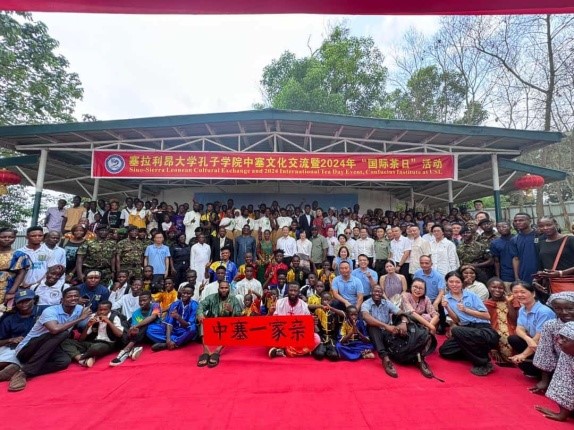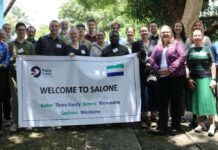By Foday Moriba Conteh
In commemoration of International Tea Day, which is observed annually on May 21st as announced on November 27, 2019, during the 74th United Nations General Assembly, the Confucius Institute at Fourah Bay College, University of Sierra Leone, in partnership with the Embassy of the People’s Republic of China in the Republic of Sierra Leone, hosted a celebration on Friday, May 24, 2024. The event, held at Taiji Garden on the Fourah Bay College campus in Freetown, aimed to highlight the economic, social and cultural value of tea and foster cultural exchange between China and Sierra Leone.
The event was graced by notable guests, including Sun Hongshan, Vice Governor of Jiangxi Province, China; His Excellency Ambassador Wang Qing, Ambassador of the People’s Republic of China to Sierra Leone; Nabeela F Tunis, Minister of Tourism and Cultural Affairs; Sarjoh Aziz-Kamara, Deputy Minister of Technical and Higher Education; as well as stakeholders, students and other dignitaries.
In his address, Ambassador Wang Qing, extended a warm welcome to the delegation from Jiangxi Province China and expressed gratitude for the presence of distinguished guests.
“Chinese culture, with its 5,000-year history, is a significant part of world civilization,” Ambassador Wang said. He highlighted the global appreciation of Chinese cultural forms such as martial arts, calligraphy, painting and drama, noting their impact on people worldwide, including in Sierra Leone, where many young people are engaging in cultural exchanges and learning Chinese.
He said that the event coincided with International Tea Day, a celebration recognizing tea’s role in Chinese culture and its global impact. Ambassador Wang remarked on tea’s historical significance, from the Silk Road to the modern “Belt and Road” initiative, emphasizing its role in fostering communication and integration among civilizations. He highlighted the United Nations’ declaration of May 21st as International Tea Day, acknowledging tea’s economic, social and cultural value.
Ambassador Wang also discussed the Global Civilization Initiative (GCI) proposed by President Xi Jinping, which advocates for the respect for diverse civilizations, common human values and the importance of cultural inheritance and innovation. He mentioned the commitment made during President Bio’s state visit to China to strengthen bilateral and multilateral collaboration to implement the GCI, aiming to enhance people-to-people exchanges and mutual understanding between China and Sierra Leone.
He also expressed gratitude to the Government of Sierra Leone for supporting cultural exchanges and acknowledged the contributions of the teachers and staff at the Confucius Institute. Ambassador Wang concluded by expressing his hope that cultural exchange would bring China and Sierra Leone closer together, fostering a strong friendship and a promising future.
On her part, Nabeela F Tunis, Minister of Tourism and Cultural Affairs, highlighted the inherent diversity of humanity, emphasizing the importance of various forms of exchange, including cultural interactions. She commended the Confucius Institute for promoting cultural understanding and education, noting that Confucius mass education effort aligns with Sierra Leone’s commitment to free quality education for all. “His ideals of morality, kindness, justice, and sincerity are naturally ingrained in the consciousness of ordinary Sierra Leoneans,” she remarked.
The Minister acknowledged the increasing cultural exchanges between Sierra Leone and China, citing the growing number of Sierra Leoneans traveling to China to experience its culture first-hand, the rising number of intermarriages, and the expanding Chinese community in Sierra Leone. She expressed optimism about the future of cultural fusion between the two countries, celebrating the shared exploration, nurturing, and exchange of transformative knowledge.
She also celebrated International Tea Day, discussing the historical significance of tea, which originated in southwest China and has been consumed for over 5,000 years. She highlighted the economic importance of tea production and processing for millions of families in developing countries. Although tea farming is not currently a significant source of income in Sierra Leone, she expressed hope that, with Chinese expertise and government focus on agriculture, Sierra Leone could potentially develop a vibrant tea industry.
Minister Tunis concluded by expressing gratitude to the Confucius Institute and the University of Sierra Leone for their dedication and contributions to cultural exchange.
His Excellency Sun Hongshan Vice Governor of Jiangxi Province China, extended sincere congratulations on the event and a warm welcome to all guests, expressing heartfelt thanks to the friends of Sierra Leone who support the development of the Confucius Institute.
He emphasized the significance of International Tea Day, noting that China was the first country in the world to discover and drink tea, making it the birthplace of tea culture, highlighting tea’s role as a crucial connector in China’s global exchanges, from the Silk Road to the Belt and Road Initiative.
His Excellency Sun Hongshan explained that tea embodies the Chinese pursuit of harmony between humanity and nature and reflects the peaceful vision of friendly coexistence and solidarity shared globally. Sun praised the unique qualities of Chinese and Sierra Leonean tea, advocating for a shared unity through cultural diversity, which aligns with the vision of a China-Africa community with a shared future.
Reflecting on the bilateral relations, Sun Hongshan recounted Chinese President Xi Jinping’s high regard for China-Sierra Leone relations during President Bio’s state visit to China earlier in the year. He quoted a Chinese saying, “clear tea is for the two friends,” emphasizing the event’s goal to foster peace, enhance courtesy, and promote inclusiveness, wishing that the China-Sierra Leone friendship would be as enduring as the fragrance of tea.
He acknowledged the Confucius Institute’s significant role in facilitating Chinese language learning and cultural understanding worldwide. As the first Confucius Institute in West Africa, the Confucius Institute at the University of Sierra Leone has opened a window for Sierra Leoneans to learn about China and foster mutual support and understanding.
The ceremony included the sampling of various Chinese teas and featured artworks by attendees. The event culminated with vibrant cultural performances, celebrating the rich cultural exchange between China and Sierra Leone.




